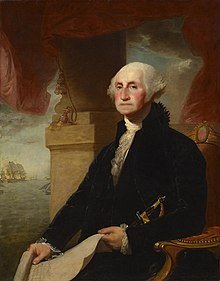history of first united state President George Washington
 President George Washington
President George Washington
George Washington legacy remains among the two or three greatest in American history, as Commander-in-Chief of the Continental Army, hero of the Revolution, and the first President of the United States.
George Washington – a renowned hero of the American Revolutionary War, commander-in-chief of the Continental Army, and president of the Constitutional Convention – became the first President of the United States under the new Constitution in 1789. The national capital moved from New York to Philadelphia in 1790 and finally settled in Washington DC in 1800.
The major accomplishments of the Washington Administration were creating a strong national government that was recognized without question by all Americans.[57] His government, following the vigorous leadership of Treasury Secretary Alexander Hamilton, assumed the debts of the states (the debt holders received federal bonds), created the Bank of the United States to stabilize the financial system, and set up a uniform system of tariffs (taxes on imports) and other taxes to pay off the debt and provide a financial infrastructure. To support his programs Hamilton created a new political party – the first in the world based on voters – the Federalist Party.
Thomas Jefferson and James Madison formed an opposition Republican Party (usually called the Democratic-Republican Party by political scientists). Hamilton and Washington presented the country in 1794 with the Jay Treaty that reestablished good relations with Britain. The Jeffersonians vehemently protested, and the voters aligned behind one party or the other, thus setting up the First Party System.
Depiction of election-day activities in Philadelphia by John Lewis Krimmel, 1815
Federalists promoted business, financial and commercial interests and wanted more trade with Britain. Republicans accused the Federalists of plans to establish a monarchy, turn the rich into a ruling class, and making the United States a pawn of the British.[58] The treaty passed, but politics became intensely heated.[59]
The Whiskey Rebellion in 1794, when western settlers protested against a federal tax on liquor, was the first serious test of the federal government. Washington called out the state militia and personally led an army, as the insurgents melted away and the power of the national government was firmly established.[60]
Washington refused to serve more than two terms – setting a precedent – and in his famous farewell address, he extolled the benefits of federal government and importance of ethics and morality while warning against foreign alliances and the formation of political parties.[61]
John Adams, a Federalist, defeated Jefferson in the 1796 election. War loomed with France and the Federalists used the opportunity to try to silence the Republicans with the Alien and Sedition Acts, build up a large army with Hamilton at the head, and prepare for a French invasion. However, the Federalists became divided after Adams sent a successful peace mission to France that ended the Quasi-War of 1798.[58][62]
Slavery
Main article: Slavery in the United States
Slaves Waiting for Sale: Richmond, Virginia. Painted upon the sketch of 1853
During the first two decades after the Revolutionary War, there were dramatic changes in the status of slavery among the states and an increase in the number of freed blacks. Inspired by revolutionary ideals of the equality of men and influenced by their lesser economic reliance on slavery, northern states abolished slavery.
States of the Upper South made manumission easier, resulting in an increase in the proportion of free blacks in the Upper South (as a percentage of the total non-white population) from less than one percent in 1792 to more than 10 percent by 1810. By that date, a total of 13.5 percent of all blacks in the United States were free.[63] After that date, with the demand for slaves on the rise because of the Deep South's expanding cotton cultivation, the number of manumissions declined sharply; and an internal U.S. slave trade became an important source of wealth for many planters and traders.
Congratulations @zoboq! You received a personal award!
You can view your badges on your Steem Board and compare to others on the Steem Ranking
Vote for @Steemitboard as a witness to get one more award and increased upvotes!